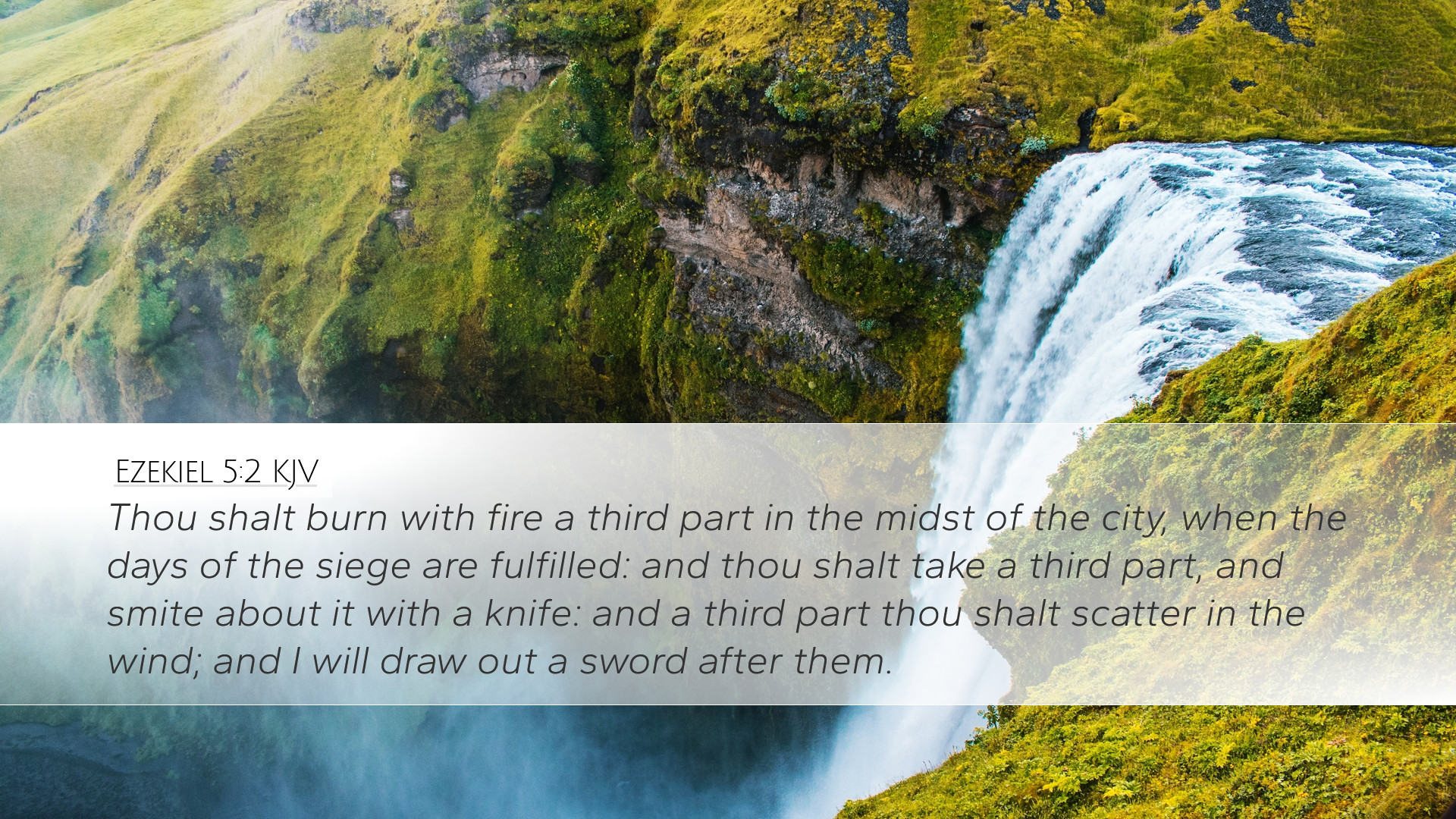Commentary on Ezekiel 5:2
Ezekiel 5:2 (KJV): "And a third part of thee shall die with the pestilence, and with famine shall they be consumed in the midst of thee: and a third part shall fall by the sword round about thee; and I will scatter a third part into all the winds, and I will draw out a sword after them."
Introduction
The verse Ezekiel 5:2 emerges within the larger framework of judgment against Jerusalem and the instructions given to the prophet Ezekiel. This verse vividly illustrates the severity of God's impending judgment, delineating the catastrophic fate that awaits the people of Jerusalem due to their rebellion against Him. Each segment of this verse brings to light significant theological and practical lessons, which are explored through the insights of several renowned public domain commentators.
Overview of Context
The book of Ezekiel, attributed to the prophet Ezekiel, is set during the Babylonian exile. The people of Israel faced dire consequences due to their unfaithfulness to God and the breaking of His covenant. Ezekiel, called to be a watchman for the house of Israel, often delivered messages laden with stark warnings and profound imagery intended to awaken the hearts and minds of the people. In Ezekiel 5:2, the severity of the judgment is made concrete through a piercing division of the population and their fate.
Commentary Insights
1. The Judgment of Pestilence and Famine
Matthew Henry emphasizes the significance of the first part of the judgment — pestilence (disease) and famine — representing immediate calamities as divine tools of discipline. It mirrors God's warnings previously conveyed through the law, where disobedience would yield suffering (Deuteronomy 28). The prophet vividly portrays the dire consequences of choosing to forsake God and His commands. The use of pestilence suggests a personal affliction, where the health and vitality of individuals come under divine scrutiny, serving as a profound lesson for modern readers about the consequences of sin.
2. The Sword and Its Significance
Albert Barnes expounds on the symbolic meaning of the sword, which represents both external conflict and internal strife. The reference to a third part falling by the sword signifies the active participation of foreign nations as instruments of God’s judgment. This reflects the idea that God’s sovereignty operates through various means, including natural violence as a consequence of spiritual failings. It serves as a sobering reminder of the role that external forces play in divine judgment and bespeaks the interconnectedness of nations and their spiritual reality. Barnes encourages contemporary readers to consider how their community's moral state might attract similar consequences.
3. Scattering and the Loss of Identity
Adam Clarke highlights the final portion of the verse, wherein the third part of the people is scattered into all winds. This scattering symbolizes a loss of identity, community, and lineage, as the scattered individuals would lose their homeland and face the challenges of exile. Clarke notes that such disconnection from one’s roots echoes a profound spiritual message about the loss that sin incurs — not just for the individual but for the collective community. This element serves as a warning regarding the cultural and spiritual consequences of turning away from God.
Theological Reflections
The analysis of Ezekiel 5:2 reminds us of the seriousness of God’s judgments while also manifesting His justice and righteousness. Each segment of the judgment reveals the multifaceted nature of divine intervention and the consequences that follow persistent disobedience.
- The Sovereignty of God: The verse reinforces God's authority as the ultimate judge who governs the fate of nations.
- The Reality of Consequences: It serves as a stark reminder that every sin bears consequences — a theme resonant in both the Old and New Testaments.
- The Call to Repentance: The context compels listeners to reflect on the importance of turning back to God and the mercy He extends even in judgment.
Practical Applications
For pastors and theologians, Ezekiel 5:2 offers a multi-layered opportunity for pastoral care and exhortation:
- Encouragement to Examine Personal and Corporate Faithfulness: This verse urges congregations to regularly assess their fidelity to God's Word and way.
- Communication of God’s Holiness: It's essential to teach about the holiness and justice of God, emphasizing that His judgments are not capricious but rooted in righteousness.
- Hope in Repentance: Highlighting God’s readiness to forgive and restore provides hope and encourages serious dialogue regarding repentance and transformation.
Conclusion
In conclusion, Ezekiel 5:2 stands as a powerful exhortation about the seriousness of sin and the realities of divine judgment. Through insights gathered from esteemed public domain commentators, we are reminded both of the peril of negligence in our spiritual walk and the enduring hope found in God’s grace when we turn to Him. The call is clear — a call to heed the warnings and to align one’s life with God’s statutes in earnest pursuit of holiness.


